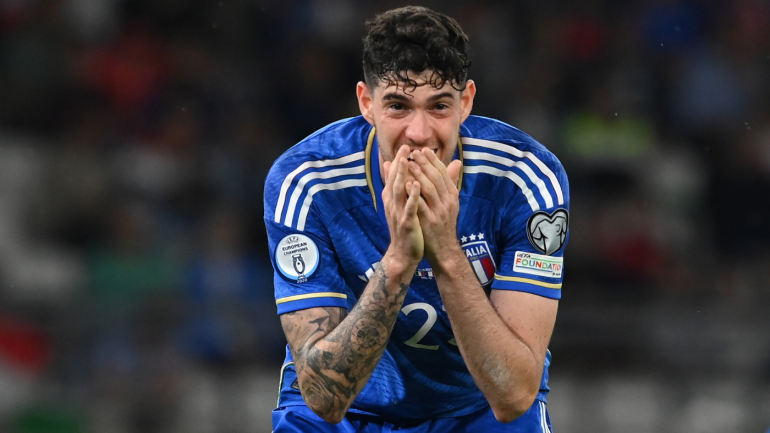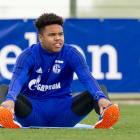
The field for Euro 2024 is getting ever closer to completion. The coming days brings the conclusion of the group stage of qualification, after which 20 of the teams joining Germany next summer will be confirmed. Here's what to look out for:
1. Italy couldn't blow it again, could they?
If a 24 team European Championships seemed destined to offer anything it was a supremely easy path through the qualifiers for Europe's biggest names. After all, not only do the top two go through from each group but there are also slots set aside for teams based on their Nations League performance. Italy, the defending champions, might be relieved of that because right now they are far from guaranteed to be in Germany next summer.
Their fate remains firmly in their hands with two games to go in Group C, but those are matches that seem tailor made to have Italians thinking about their destiny in all the wrong ways. Their final match pits them against Ukraine in what will be a winner takes all battle for second place behind England, who cruised past the Azzurri at Wembley last month, but before then is the visit of an old foe who is bound to have nerves jangling. Aleksandar Trajkovski sent Italy crashing out of the World Cup before the tournament proper had even begun in 2022 when North Macedonia beat the European champions in a qualifier in Palermo, a result that many still have not recovered from. Certainly in Luciano Spalletti's first game in charge those scars were apparent in a 1-1 draw in Skopje.
A 29-man squad certainly gives Spalletti options this time around, perhaps too many, with Andera Colpani of Monza among those called upon to fill the gap in the squad left by the suspended Sandro Tonali. In both World Cup qualifiers and this Euro round, however, Italy's big issue has been putting the ball in the back of the net. Gianluca Scamacca has been doing so regularly for Atalanta this season. If he or Giacomo Raspadori can deliver, then the holders should feel confident that they can get to Germany without having to worry about any playoffs.

Golazo Starting XI Newsletter
Get your Soccer Fix from Around the Globe
Your ultimate guide to the Beautiful Game as our experts take you beyond the pitch and around the globe with news that matters.
Thanks for signing up!
Keep an eye on your inbox.
Sorry!
There was an error processing your subscription.
2. Surprise arrivals on the biggest stage
Albania might have graced the Euros for the first time in 2016, but few would have fancied this team to be turning out in Germany eight years later, particularly after their campaign began with what appeared to be a regulation 1-0 defeat in Poland. New manager Sylvinho -- a former left back of Corinthians, Arsenal and Barcelona -- had other plans, and since then the Eagles are undefeated, the only points they have dropped coming in an impressive 1-1 draw in Prague in September. Three days later they beat Poland in Tirana, repeating the trick last month against Czechia and Bulgaria. Now the equation is simple, avoid defeat against Moldova (themselves a surprisingly frisky side who have not lost a home qualifier) and they are through.
If Albania's presence would be a surprise, it would nothing to the brain melting that would come if Kazakhstan, perennial qualification whipping boys, were to make it to the Euros. Beat San Marino, however, and they would have a chance in their final game in Slovenia, one that would be even greater if Denmark overcome the Slovenians on Friday. Meanwhile even Luxembourg, the proto-road kill of European qualifiers for so long, go into the final round of fixtures with at least a shot at qualification.
There are critiques to be levelled at the Nations League, one of which will come up before too long, but between those competitive games and a qualification process where there really is a chance for many, it is fair to say that UEFA have done something to raise the standard of the game across their continent. That may yet be reflected in a fascinating field next summer.
3. Israel racing to accrue points
The outbreak of the Israel-Hamas war last month meant that fixtures the Sky Blue and Whites had been due to play during the October international break could not be played. That means Alon Hazan's side face an extremely hectic November, four games to be played in the space of nine days so that qualification can be concluded in Group I. Israel came into these games with a real chance of reaching their first ever European Championships, four points off Switzerland but with two games in hand.
Their opening game of this round of qualifying rather dented their chances, however. Amid heightened security and in front of a small crowd, Kosovo got a 1-0 win that means they are still able to escape Group I, their only goal coming from Milot Rashica in the first half. Still, Israel have a chance. Beat Switzerland and Romania in Hungary, their home base for the next two qualifiers, and they have a real chance. They will need a helping hand from Kosovo in Basel on Saturday, but it is not over yet for a team chasing their first major tournament appearance in over 50 years.
4. Wales vying with Croatia
Four games into qualifying, Wales seemed done for. They had been averaging just a point a game and had been brushed aside by Armenia in Cardiff, a city where Europe's finest nations feared to tread recently. They might again, however, with Rob Page's side having wrestled their fate back into their own control with a brilliant 2-1 win over World Cup semifinalists Croatia in Cardiff last month.
"We didn't like what we saw in June," said Page. "We put things right in September and built on it in October, and then capped it off with one of the best performances that I've seen, but we've got to build on that as it will count for nothing if we don't follow it up. We need to sustain those levels."
All the more remarkable for Wales, beating Croatia came without the now retired Gareth Bale and the oft-injured Aaron Ramsey, the two talismans of the nation's remarkable recent history. Harry Wilson of Fulham stepped up on that night while Page will be looking for Tottenham's Brennan Johnson to deliver now he is fit. Both the Dragons and Croatia would do well to take maximum points from the games ahead of them. The former travel to Armenia before facing already qualified Turkey while Croatia, assured of a play off spot from their Nations League achievements, round out the qualifiers against the Armenians after travelling to Latvia. Their battle promises to be one of the most intriguing of the next few days.
5. Why Ireland need to lose
Those of you who have made it all the way to the bottom of this piece will be in no doubt that you are in the presence of a Nations League admirer. The previous iteration of the international game brought too many low stakes friendlies that would achieve nothing but sucking the joy out of football. Now, lower tier nations are showing signs of the progress that comes when you regularly test yourself against teams at or around your level. Plus, England got relegated. Oh how we laughed. What's not to like?
One thing and one thing alone: A two path qualifying system for Euro 2024 might give the Nations League merit but it does also open up slightly curious incentives in the dog days of qualifying. Take, for instance, the Republic of Ireland, who have done next to nothing in qualifying to merit a spot in Germany. Through an intriguing and extremely unlikely quirk they could find themselves there next summer, however, due to their standing in the Nations League.
To briefly explain: three spots at the tournament are reserved for playoffs based on teams performances' in the 2022-23 Nations League. Those are awarded to four teams from each of Leagues A (the top tier), Leagues B and C. Should League A not send four representatives then the best team in League D, Estonia, will get a spot in qualifiers. Then if there are still gaps those are filled in based on the rankings of European nations. The Irish, placed 26th, need as few spots as possible to open up in League A, allowing them to potentially sneak in.
It should be said this is all looking very unlikely. One of Italy or Ukraine, both ranked ahead of the Republic, will need a playoff spot, as will Croatia or Wales. At the time of writing Iceland look to be on course to earn one of the 12 places, if more open up then Norway would be next in line before the Boys in Green. What Ireland really need, however, is to make sure that no more League A teams need a second chance. That means being absolutely certain that the Netherlands finish ahead of Greece. In short, it is far more in Irish interests to lose to the Dutch than it is to beat them. Of course, one might reasonably suggest that the result might not be all that different if Ireland were playing for a win anyway, so poor have they been of late, but it would be an unwise move to go full tilt in Amsterdam on Saturday. You never know...
















